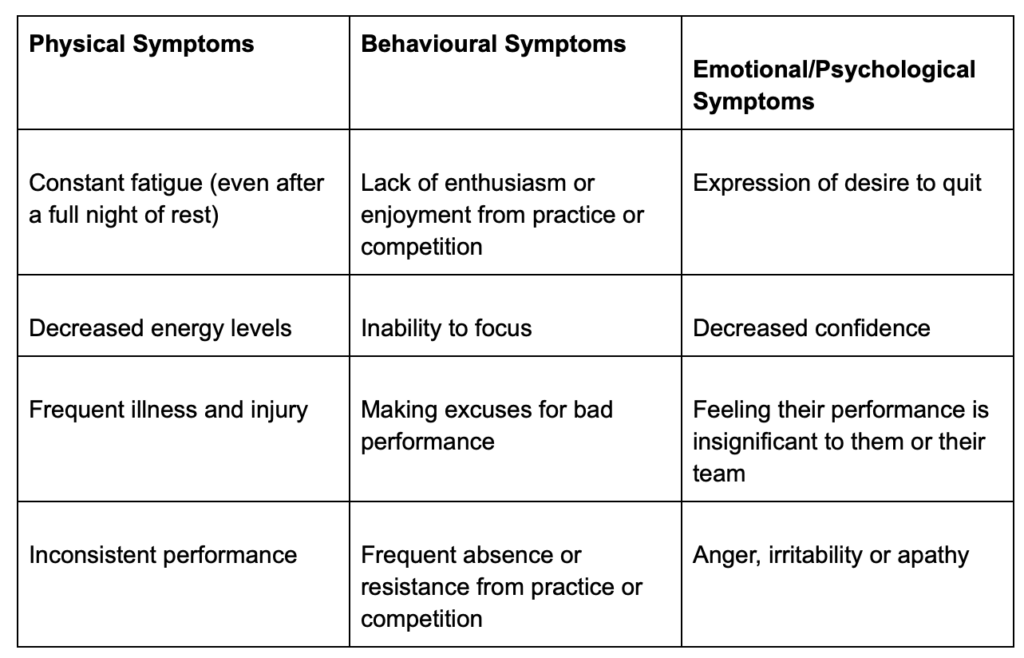Sport teaches people social interaction, hard work, the meaning of success and coping skills for failure. However, when recreational athletics turn to intense competitive sports, emotional fatigue is too often the result. Emotional fatigue is a state of feeling emotionally worn-out and drained due to accumulated stress from your day-to-day routines. It is one of the signs of burnout.
When an athlete or performer experiences overpowering tiredness and lack of energy from the constant training and competition sessions, they are experiencing what is known as a burnout, in which they begin to lose interest in the sport.

Highlights
- Emotional fatigue is a state of feeling emotionally worn-out and drained as a result of accumulated stress from your day-to-day routines. It is one of the signs of burnout,
- Coming in contact with stressful stimuli and anxiousness on a regular basis is quite normal, but persistence of the same can leave a lasting negative impact on the body. Emotional fatigue is caused by a long period of constant stress, whether at home or related to sports,
- A negative memory/preconceived ideas/expectations can induce stress. Stress is a chain reaction. The hypothalamus receives a distress signal from the amygdala when a stressful event is experienced.
Athletes with emotional fatigue often feel that they have no power or control over what happens in life. Sometimes they tend to freeze in certain scenarios. Due to inadequate energy and motivation, followed up by improper sleep patterns, overcoming fatigue on an emotional scale can be quite daunting. As time passes, this constant state of being stressed-out has the potential to bring indelible damage to your psychological health.
Causes of emotional fatigue
Coming in contact with stressful stimuli and anxiousness on a regular basis is quite normal, but persistence of the same can leave a lasting negative impact on the body. Emotional fatigue is caused by a long period of constant stress, whether at home or related to sports.
Emotional fatigue in sport can occur due to various factors, ranging from high expectations to loss of love for the sport and sometimes injury too.
Maladaptive perfectionism refers to the rigid standards and unrealistically high expectations that one places upon oneself. With the unpredictability of sport, being unable to cope with challenges or changes can lead to excessive stress, and in turn, emotional fatigue.
The athlete’s perception of stress and pressure is what matters most in the development of emotional fatigue. Performance becomes difficult when it starts to feel like a routine. Unfortunately, this type of outlook on sport at best hinders performance and at worst leads to giving up entirely.
Symptoms of emotional fatigue

Science
How your brain perceives and acts upon emotional stimuli
Even though we think of emotions as internal states, psychologists define them as a combination of cognitions, feelings, and actions. Hence, this implies that what we consider emotions’ are not limited to only how we feel, but also how we exercise and react to feelings. Emotions serve to protect you from danger so you can survive to pass on your genes. The ‘fight-or-flight’ response that prepares us to defend ourselves or escape danger is also an emotional response.
For these reasons, the brain takes on the function of evaluating a stimulus—such as a tough game situation or playing against a much-experienced opponent—and crafting an emotional response to it. The brain thinks in terms of how it can best respond to a situation in order to survive, and it uses emotions as the catalyst to convince the rest of your body to act accordingly.
Brain chemicals dictate your mood
A huge amount of information is processed each second in your brain, which is a complex mesh. The brain and central nervous system have a system of networks (neurons) that transmit and receive information for processing throughout different parts of the brain. Signals are sent by neurons as chemicals known as neurotransmitters; while some neurons release and others receive. The chemicals in action here are the specific ones that allow a flow of information to be communicated between the parts of the brain.
Norepinephrine, dopamine and serotonin are three of the most frequently studied neurotransmitters. Dopamine is the chemical that gives us a sense of happiness or pleasure upon receiving a reward when learning something new or something good. Dopamine is the neurotransmitter released in this scenario as a sign of a reward being granted, and this encourages the nervous system to seek this reward more. Serotonin is responsible for memory and learning. One method to ease depression and anxiety is said to be neuron or nerve cell regeneration, which is one of the functions of serotonin. An imbalance in serotonin levels results in an increase in anger, anxiety, depression and panic. Norepinephrine helps moderate your mood by regulating and controlling blood pressure.
Abnormalities in how the brain receives and processes these chemicals can have a big effect on your emotions. For example, the brain associates the chemical dopamine to be the reward of doing something pleasurable or joyous, so dopamine is identified by that part of the brain as such. Simultaneously, if the amount of dopamine released in a happy or pleasurable situation is less than the normal amount released, it can be perceived as sadness.
Various emotions are controlled by multiple parts of the brain
Your central nervous system, which includes the brain, is simultaneously working together with all its parts to process the sensory information it receives from somatic receptors all over the body. The main part of the brain responsible for processing, the limbic system, is sometimes called the ‘emotional brain’.
Part of the limbic system, called the Amygdala, assesses the emotional value of stimuli. The fight or flight response by the sympathetic nervous system is mainly under the responsibility of this part, as it is the part of the nervous system and brain that is corresponded with fear reactions.
While the amygdala is associated with emotion recognition, the hypothalamus is responsible solely for how we react to those perceived emotions. When your breathing pattern speeds up while your heart rate and blood pressure increases too, upon coming in contact with excitatory or fearful stimuli, that’s a way of seeing that the hypothalamus is doing its job right. Your experience and memories are a way of knowing how to react and adapt to the environment around you, which includes how we respond to various emotions we encounter on the way. Two sides of the brain analyze information differently and work together to keep the emotions in balance. A simple way to put it through would be that the left hemisphere of the brain interprets what the right hemisphere identifies. For example, if the right hemisphere identifies a dangerous stimuli, say, a wild animal, the left hemisphere is immediately alerted to take an action, and it decides how to respond based on logic.
Your memories drive and inform your emotions
One determinant of your positive or negative mood is recalling a positive or a negative memory. Experience is a key influencing factor of how you react based on emotions in certain situations or to certain stimuli. For example, if you were on the verge of qualifying in a game but you end up losing, this could be a memory that makes you fearful the next time you are in the same situation. The same applies to the intensity of the experience as well. PTSD (post traumatic stress disorder) works on this principle.
Preconceived ideas also affect your emotions. Anticipation and your expectations, which are driven by memories of previous events, affect the intensity of an emotional reaction.
Stress causes fatigue
Stress can make you tired. Our sense of control is lost when we experience high stress and we feel exhausted. When a stressful stimulus comes in contact with us, our response system is in a state of emergency triggering a rush of adrenaline from the adrenal glands. The serotonin released then is either used up immediately or starts to run slow in order to stabilize our mood. Towards the end of the process, the hormone of stress, cortisol is released and it helps to replenish the energy lost in response to the stressful stimuli. Once the stress stimulus is no more, the cortisol levels in our body lower to return to homeostasis.
In the instance where the stressful stimulus is prolonged over a period of time or it is chronic in nature, the adrenal glands are unable to release adequate amounts of cortisol to cope with the stressor. And high cortisol levels impair the brain’s functioning.

Actionables
Ways to combat emotional fatigue
- Schedule one day off from training this week. Be part of an activity that is irrelevant to your training programme/sport/routine. Something spontaneous will give your brain some much-needed rest too.
- Change your relationship with sport: List ten reasons why you enjoy training and performing in your sport.
- Develop stress management and coping tools such as:
- Breathwork: Breathing is the fastest way to alter our state of being and shift out of a negative mindset, and it’s away from limiting beliefs. Breathing patterns and practicing breathing exercises is one of the most effective ways of lowering the amount of stress stored up in the body.
- Mindfulness: Mindfulness is the act of engaging with the present moment. It helps with steering your thoughts away from the likes of potential negative stimuli and thinking negatively. It’s about turning down the volume in your mind by coming back to the body.
- Doodling/Colouring: Invest some time in doodles or coloring whenever you are able to and make it part of your everyday routine. It massively helps with boosting creativity and also allows your mind to get some time off from intensive thinking. The added bonus factor is that it gives you some sense of accomplishment without having to look at a blank page that represents unproductivity or a stressful stimulus.
- Taking a walk: Spending time outdoors is a boon for those who know what it can do to help. Perceiving the sounds of the environment like the vehicles, birds, wind and the chattering noise of people, all of it helps to keep you connected to the moment and the environment around you by keeping your attention on what your senses can see.
- Focusing on one thing at a time: Your to-do list can be a form of mindfulness if you do it right. A stopwatch or timer can prove to be useful in keeping your undivided attention on one particular task and seeing it through to the end with no distractions. No browsing the internet, checking the phone, looking at notifications–zero multitasking. Until the timer goes off, let one task take your full attention.
- Journalling: There is no right or wrong way to journal. Just jotting down your thoughts or writing a structured journal helps ease the mind and tame swirling thoughts. Write down what you are grateful for or just write down three good things that happened today.
- It’s not always about the outcome: After the next game analysis, “What went well today?” rather than “How did you play today?”
- Prioritize self-care.
- Make sure training/practices include some unpredictability. Monotony in practice can lead to burnout/ emotional fatigue: Add in a new drill that is challenging and fun but still achievable.
Every emotion regulation technique helps. Consistency is key when it comes to practicing mindfulness, and it makes a lot of positive difference. Practicing mindfulness or any other coping tools regularly can help you calm your mind and move past negative emotions. Try to take at least five minutes each day to check-in and pick any of the above-mentioned tools/ exercises that you enjoy.
Conclusion
Emotions are feelings that are processed by a team of brain regions. This process of regulating emotions is a complex one that does not always work like it is expected to. When circumstances are overwhelming, athletes find it difficult to regulate their emotions. Lucky for us, the brain is plastic in nature, so it has the capacity to adapt and change from the experience.
Interventions including activities like exercising regularly, following a sleep routine, taking time out to practice mindfulness, breathing and finding purpose in life enable plasticity.
Stress is an unavoidable part of life, but it is not the end. As humans, we are faced with stressful situations because we have the tools to cope with them, according to the laws of equilibrium. Chronic stress, however, is one kind that can leave lasting effects on the nervous system and its functioning. Comprehending the impact it can have on our mind and equipping ourselves with tools on how to overcome them in order to encourage all-round mental, physical and psychological health.
Disclaimer: The contents of this article are for general information and educational purposes only. It neither provides any medical advice nor intends to substitute professional medical opinion on the treatment, diagnosis, prevention or alleviation of any disease, disorder or disability. Always consult with your doctor or qualified healthcare professional about your health condition and/or concerns before undertaking a new healthcare regimen including making any dietary or lifestyle changes
References
- https://www.diva-portal.org/smash/get/diva2:135387/FULLTEXT01.pdf
- https://www.sciencedaily.com/releases/2015/07/150731105248.htm
- https://www.womenssportsfoundation.org/inspiration/when-more-isnt-better-dealing-with-burnout-in-competitive-sports/
- https://science.howstuffworks.com/life/inside-the-mind/human-brain/5-ways-your-brain-influences-your-emotions.htm
- https://www.numerade.com/books/biological-psychology-10th/?gclid=CjwKCAiA0KmPBhBqEiwAJqKK41c2rBMuZ2EoVQAZOPnMttuWsOMKyNWF4jtpZ0uopMmDWggQrVdeQxoC5OEQAvD_BwE








